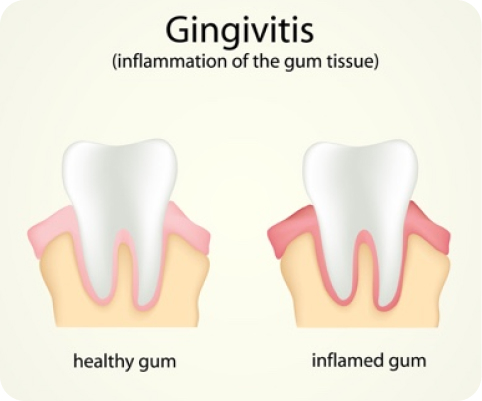Over 9 out of 10 Americans have had or will have some form of gum disease in their lifetime. Greenspoint Dental is here to make sure you have your periodontal or gum disease treated effectively and efficiently.
Gingivitis
Gingivitis is an inflammation of the gums and a form of periodontal disease. Most people get gingivitis from plaque remaining on their teeth for so long the plaque bacteria begins to irritate the gums, causing them to become swollen and sensitive.
Those at risk for getting gingivitis are those with poor dental hygiene, misaligned teeth, uncontrolled diabetes and those who are pregnant.
Symptoms of Gingivitis
- Swelling, redness, tender and bleeding gums
- Mouth sores
- Bad breath
- Gums change in structure and color

Gingivitis Treatment
The main focus of gingivitis treatment is to reduce inflammation. A great way to do this is to come to Greenspoint Dental and have one of our skilled dental hygienists give you a thorough teeth cleaning to remove any plaque deposits that may harm your gums.
After the teeth cleaning, it is important to get in a habit of quality oral hygiene: brushing twice a day, flossing daily and getting a professional teeth cleaning at least twice a year.
The main focus of gingivitis treatment is to reduce inflammation. A great way to do this is to come to Greenspoint Dental and have one of our skilled dental hygienists give you a thorough teeth cleaning to remove any plaque deposits that may harm your gums. After the teeth cleaning, it is important to get in a habit of quality oral hygiene: brushing twice a day, flossing daily and getting a professional teeth cleaning at least twice a year.
Periodontitis
If you don’t get your gingivitis treated it can turn into something much worse such as periodontitis. The gums will eventually space out from the teeth and form pockets that become infected. In due course, this can lead to teeth loss. Periodontitis symptoms resemble gingivitis’, with the addition of loose teeth.
Periodontitis Treatment
The goal of periodontitis treatment is to lessen inflammation, take away pockets and address how periodontitis began. There are a few different methods of treatment depending on how severe it is.
Scaling and Root Planing: Instruments are used during the cleaning process that loosen, remove and smooth out teeth deposit bacteria that irritate the gums. This helps provide a clean area for the gums to reconnect with the teeth.
There are also surgical options such as:
Flap Surgery/Pocket Reduction Surgery: Gums are lifted back and tartar is removed. Gums are then replaced in a way that the tissue fits tightly around the tooth. This process helps decrease the area where bacteria can remain.
Bone or Soft Tissue Grafts: Fragments of your own bone, tissue or donated bone or tissue replaces that which was harmed because of gum disease. The bones and tissue regrow and restore stability to teeth.
Guided Tissue Regeneration: A small piece of fabric is inserted between bone and gum tissue to stop tissue from going where the bone should be. It is performed when the bone supporting your teeth was harmed, and ignites bone and gum tissue growth.
Bone Surgery: Polishes craters in the bone due to moderate and advanced bone loss. This is done after flap surgery to reshape the bone around the tooth to lessen the craters, so bacteria can’t grow.
Contact Greenspoint Dental today to learn more about gum disease and how to get it treated at our Houston office.

Schedule an Appointment with us